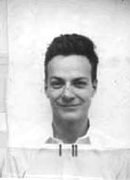Surely I am not joking, Mr. You
Tuesday, June 27, 2006

If Mathematics is said to be the language of nature, then Physics is the semantics that holds the laws of everything together.
Knowing a bit of both gives anyone the power to understand what makes the Universe tick (of course, according to the laws we say are laws). So it had to happen at some point that a group of the smartest scientist in our written history would start meddling with Nature itself, and eventually crack one of its mysteries.
The Manhattan project was a large and secretive undertaking. The US Army put together the best minds of the 20th century to develop the most powerful weapon ever known to humanity. Among this group of peculiar characters, they included Richard Feynman.
Richard Feynman achieved his notoriety after winning the Nobel Prize in Physics in 1965.
(Note that when it comes to famous physicists, Einstein was in the top of the list of the profession. He was, in fact, one of the few to achieve fame during his lifetime. We equate mushrooms clouds, immense balls of fire, and the destruction of our planet to his name--does E=mc
2 ring a bell?)
"Dick," as he called himself, was quite an interesting person, with a self deprecating attitude that reminded everyone of how smart he really was. (I wonder if he actually intended it that way--check out his
documentary and see what I mean.)
Like I said above, he won the Nobel Prize in physics, which according to him did not want but still accepted; he was an exceptional
lecturer; he had the ability to explain the most complicated concepts in a way that was actually understandable (according to colleagues and former students); and, perhaps most importantly, he took part in the development of Quantum Physics.
Surely You're Joking, Mr. Feynman. Adventures of a Curious Character gives an unusual peek at the mundane happenings of a great mind. Before buying the book, I had read reviews so I knew that it was not written by Feynman, but was put together by his friend from recorded interviews. This fact adds to the book a conversational tone, but at times if feels awkward.
From the first half of the book, you gathered that he was perceived as eccentric and was at times sociably clumsy, if one observes the typical rules of society. I personally enjoyed more the second half of the book, which deals with some of his traveling to Brazil, his role in the creation of the atomic bomb, and his views on education, particularly science.
There are indeed funny anecdotes, but you will have to read the book yourself--there are too many to quote, and I don't really feel like writing a proper "book review." :)
By the way, this is not a physics book. It is a light, entertaining read of what happens when a grown man tries different things.
For a more scientific read, get
QED. The Strange Theory of Light and Matter. This book is a set of four lectures on Quantum Electrodynamics, and tries to explain why things are the way they are. Feynman, throughout the book, does say that things just are but we don't know why they are the way they are. And to top it all, he warns that you and I, the reader, "[aren't] going to understand anything."
For example, according to QED light is not actually an electromagnetic wave, but actual particles--Newton was right after all. He goes to explain the most important phenomena we encounter (reflection, refraction, et al) in our daily lives. He also tries to simplify every concept into understandable sentences, i.e., the lectures don't contain a lot of equations, not because they are not important but because according to Feynman we should understand the big picture first and then dig into the details.
A word of caution: if you are a bit slow like I am, you will have to re-read chapters 3 and 4. Chapter 1 is reasonable enough, however, half way through Chapter 2 I started wondering if I had skipped a few pages. I actually had not, but all of the sudden "adding arrows" to figure out probabilities was not enough for me to explain the
double-slit experiment. Needless to say, I had to start all over, and I am still going through it.
(At some point, maybe I should start reading more "real" stuff, i.e., my
Operations Management book to continue my understanding of inventory theory, forecasting models, and such silly things. As Homer would say, "Mmmmh, real world...")
Comments: